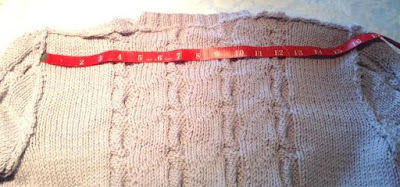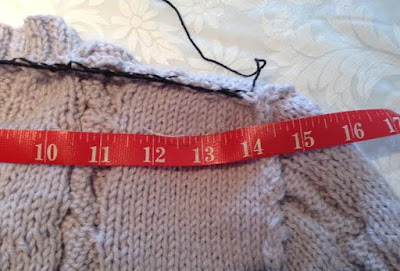I've been asked a few times to add more detail in the form of some photos to this post from 2012. You can see in the photos above, the corss back is almost 16 inches.
The original post:
The original post:
Shoulders
that stretch out of shape are a frustration to many knitters. On cut
and sew knit garments sewers are taught to use a piece of clear elastic
which is sewn right into the seam. Normally it is pinned into place
after being stretched out about 1/2 inch. It draws the shoulder up
slightly without gathering it. The real advantage is when the sleeve is
sewn in place. The elastic counteracts the tendency of the sleeve's
weight to pull the shoulder down.
I've got two methods that work the same way for knitters. The first is to use your project yarn and a crochet hook. Measure the length of your shoulder seam, let's say it is 4.5 inches. Pin your shoulder seam down on a firm pillow and squeeze it up to 4 inches, then using your crochet hook, create a chain along the seam drawing it up the 1/2 inch.
If you no longer have any of your
project yarn you can use thread. Put a double strand through the needle
so that you have four strands in total after knotting the end. Anchor it
firmly and after using the same pillow trick to stabilize the seam,
stitch along the edge of the seam making a knot every inch or so to
compress the seam down. If it puckers on the outside you have gone to
far, however depending on your gauge you should be able to easily remove
1/2 inch and often you can get up to 1 inch or more in total out of the seam
length.
If the neckline is wide enough you can crochet or sew across the back neck to eliminate even more width there. In the shot below you can see I have compressed the cross shoulder down to 14.5 inches. I got about 1/2 inch out of each shoulder and and an additional 1/2 inch from the back neck. I've used a black cotton so you can see what I've done and so I can pull this back out. In a matching yarn this would be far less visible.
If the neckline is wide enough you can crochet or sew across the back neck to eliminate even more width there. In the shot below you can see I have compressed the cross shoulder down to 14.5 inches. I got about 1/2 inch out of each shoulder and and an additional 1/2 inch from the back neck. I've used a black cotton so you can see what I've done and so I can pull this back out. In a matching yarn this would be far less visible.













No comments:
Post a Comment